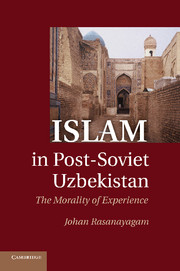Book contents
- Frontmatter
- Contents
- Illustrations
- Acknowledgements
- Note on Transliteration
- MAP: Uzbekistan and its neighbours
- Introduction: Towards an Anthropology of Moral Reasoning
- 1 Islam and Sociality in Pakhtabad and Samarkand
- 2 The New Soviet (Central Asian) Person and the Colonisation of Consciousness
- 3 Good and Bad Islam after the Soviet Union
- 4 The Practical Hegemony of State Discourse
- 5 The Moral Sources of Experience
- 6 Moral Reasoning through the Experience of Illness
- 7 Debating Islam through the Spirits
- 8 Experience, Intelligibility, and Tradition
- Notes
- Bibliography
- Index
7 - Debating Islam through the Spirits
Published online by Cambridge University Press: 01 March 2011
- Frontmatter
- Contents
- Illustrations
- Acknowledgements
- Note on Transliteration
- MAP: Uzbekistan and its neighbours
- Introduction: Towards an Anthropology of Moral Reasoning
- 1 Islam and Sociality in Pakhtabad and Samarkand
- 2 The New Soviet (Central Asian) Person and the Colonisation of Consciousness
- 3 Good and Bad Islam after the Soviet Union
- 4 The Practical Hegemony of State Discourse
- 5 The Moral Sources of Experience
- 6 Moral Reasoning through the Experience of Illness
- 7 Debating Islam through the Spirits
- 8 Experience, Intelligibility, and Tradition
- Notes
- Bibliography
- Index
Summary
In this chapter, the theme of illness is continued, but the perspective shifts from sufferers to the practice of healers who work with spirits. Within the cosmologies of healers, experiential reasoning is given objective form. The government's efforts to monitor and control religious expression have stifled public debate and the free circulation of interpretations independent of its own discourses, but Muslims in Uzbekistan are still able to develop their own understandings of Islam and contest the practice of others. We have seen that imams criticise much of the practice of Central Asian Muslims as un-Islamic innovation, but their criticism is muted by the government's celebration of an authentic Central Asian cultural and spiritual heritage. Those who do not speak from the security of the quasi-state regulatory structure that imom khatib enjoy are even more vulnerable to charges of extremism if they proselytise too vociferously.
In this environment, criticism of the practice of healing and prophesy with the help of spirits is ‘safe’. The postindependence government has not incorporated these practices within its idea of cultural authenticity. Healing with spirits falls outside the categories of Islam, religion, culture, and politics produced in state discourse and therefore is less likely to attract the attention of state officials and organs. It has become a site where debates about what it means to be a Muslim can take place in relative freedom.
- Type
- Chapter
- Information
- Islam in Post-Soviet UzbekistanThe Morality of Experience, pp. 203 - 229Publisher: Cambridge University PressPrint publication year: 2010

